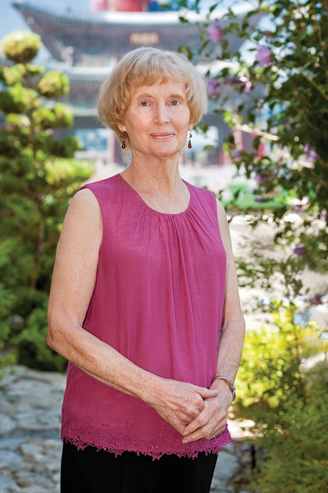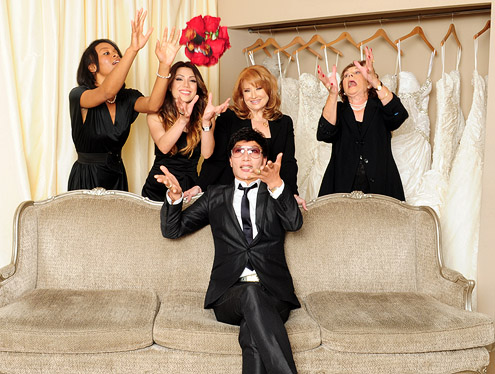Mary Connor, founder of the Korean Academy for Educators, receives the Prime Minister’s Citation for promoting Korean history and culture in the U.S.
story by Katherine Yungmee Kim
photographs by Mark Edward Harris
The Venerable Jongmae Park is sitting on a faded saffron cushion, in the ambient glow of electric candlelight, encouraging nearly 70 schoolteachers from around the nation to close their eyes. It’s part of a meditation exercise at the Thal Mah Sah temple in Los Angeles’ Koreatown, where Park—also a professor of theology at Loyola Marymount University—has spent most of the August morning educating the educators on the basic tenets and rituals of Korean Buddhism.
The teachers, from various parts of the country, have convened in Los Angeles as part of an annual Korean history and culture seminar organized by the California nonprofit Korea Academy for Educators, or KAFE for short. The five-day conference brings together Korean and Korean American studies scholars, as well as artists, musicians and writers, to help teachers better understand the culture, history and values of their Korean American students and their families.
At the helm of this endeavor is Mary Connor, a veteran teacher who founded and continues to organize, promote and fundraise for the nonprofit. Thanks to her efforts, some 2,000 educators from 23 states, 91 school districts and 43 private schools have participated in the organization’s programs since 2006. Last year alone, KAFE held 12 workshops on Korean history and culture.
This month, Connor is being honored with the Prime Minister’s Citation from the Ministry of Public Administration and Security in Korea. The ceremony, held on Oct. 5, commemorates Overseas Korean Day, and the award is given to foreigners who promote Korea in their respective fields.
“The Korean government appreciates Mary Connor’s effort, dedication, sacrifice and service,” said Consul Siheung Lim, noting her work advancing Korean culture and history and Korean American history in U.S. schools. The South Korean Consular Office in Los Angeles nominated Connor for the distinction.
[ad#graphic-square]
Connor, 73, is a teacher of 35-plus years—the majority spent at the all-girls preparatory Westridge School in Pasadena, Calif. She traces the roots of her interest in Korea to a family history project that she had assigned in her U.S. history class that proved an eye opener. “My Anglo, Chinese, Mexican American and African American students all had a sense of their roots and a connectedness of their family origins to historical events in the United States,” she recalled.
But her Korean students were at a loss. “My Korean students were living the culture,” Connor explained, describing how they spoke Korean at home, ate Korean food and took off their shoes at the door. “But they had virtually no knowledge of Korean history or sense of their rich heritage.”
She has since worked to help fill that void.
In the mid-1990s, while Connor was teaching an Asian studies course at Westridge, she noticed that lessons for educators and material found in textbooks centered on China and Japan, and there was a dearth of information on Korea. She received a fellowship from the Korea Society, a New York City-based nonprofit, in 2000 and 2004, and it was the second grant that led to the first KAFE seminar.
Around that time, Connor read Helie Lee’s Still Life with Rice, and was inspired by the Korean American author’s book about her grandmother. Connor formed a friendship with Lee, who spoke in her classroom and eventually raised money that led to the creation of the nonprofit in 2006. Lee, a co-founder, has been central to KAFE’s growth. The Jae Hak and Duk Hwa Lee Scholarship, which sponsored airfare and hotel expenses for 21 fellows from 12 states this year, is named after her parents.
“What I so admire and appreciate about Mary is that she really wanted to learn about Korea, and then to teach it correctly to her [students],” Lee said. “She is a shining star among teachers.”
After the first year’s program, Lee says it all “clicked” for her. Rather than going into assemblies and classrooms, if they approached the teachers they could exponentially impact dozens of students. “You do the math … it was more effective, and it fulfills a true need. There’s nothing like it out there.”
This year’s major supporters include the Academy of Korean Studies, the International Korean Educators Network, the Korean Cultural Center of Los Angeles, the Korea Foundation and private donors. Connor said the financial support of the Korean American community, meanwhile, has been conspicuously absent. “It’s time that a commitment is made,” she said.
KAFE’s seminars are popular with teacher participants, who leave with an armload of books on Korea, PowerPoint presentations on sample classroom lessons and instructional DVDs. They eat Korean meals, paint with Korean folk artists and drum with Korean masters.
Summer Etter, a second-grade teacher from Garden Grove, Calif., who attended the 2010 conference, said onethird of the students in her classroom are ethnic Koreans. She wanted a better understanding of not only her students, but also their parents.
She now understands that when her Korean students call her “teacher,” that it is an honorific term, not the generalization she once found disrespectful. She addresses her Korean students’ parents with the title “John’s mother,” the way that Koreans would in their native tongue. Etter’s first lesson of the year is to teach her students that, in the Korean culture, you accept something with both hands, look the gifter in the eye and say “thank you.” She says it delights her Korean students to see her awareness of their culture.
With both parents and students, she has noticed a difference in the atmosphere and rapport. “I really value what the parents have done to give their kids a better life,” she said.
Connor has written more than 25 articles and lessons on Korea in educational journals, published two books on Korea (The Koreas: A Global Studies Handbook and Asia in Focus: The Koreas), and serves on the editorial board of Education in Asia, a leading journal for high school and undergraduate educators who teach on Asia. She spent years trying to amend the California History-Social Science Standards and Framework, making multiple trips to the state Capitol to try and convince legislators to update and include more material on Korea in history textbooks. But the proposed changes to the framework were removed from the state Senate bill in August.
Connor, however, is not deterred. “I guess our workshops are more important than ever,” she said.
This month, her organization will hold workshops in California and Georgia. In early November, she will be in Chicago, and there are two additional seminars in January in Los Angeles.
“I want to honor the teachers and give them a fun time,” she said. “It’s my gift to them in the Korean Confucian tradition.”
This article was published in the October 2011 issue of KoreAm.
[ad#bottomad]









